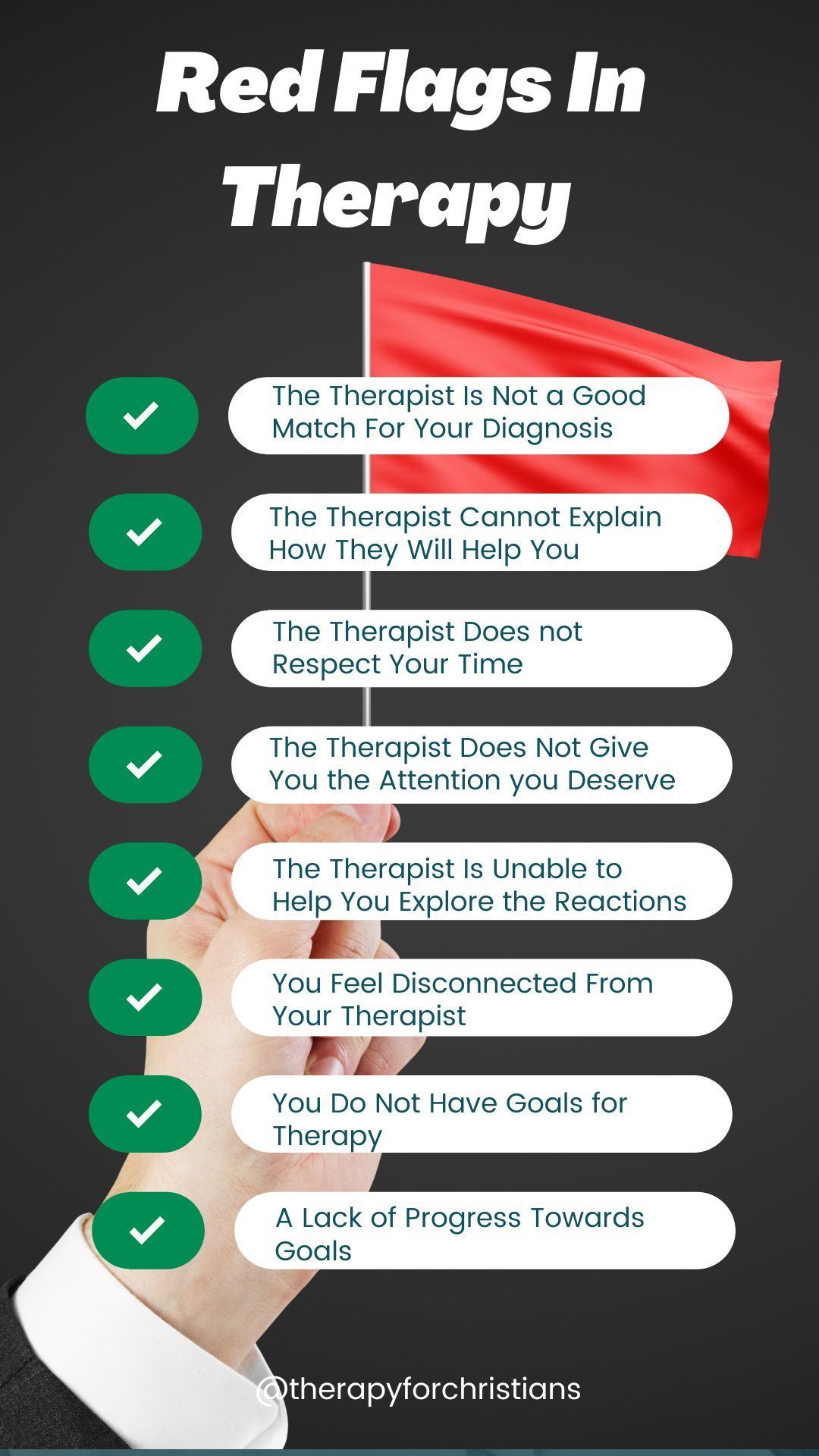
 When someone is seeking mental health treatment, they are in a vulnerable state. They may be experiencing a lot of pain and suffering and are likely looking for relief. It's vital that the therapist that they choose can provide them with the support and guidance they need. Unfortunately, not all therapists are created equal. Some may be inexperienced, unprofessional, or simply not a good fit for the individual. If you're concerned that your therapist might not be suitable for you, here are several signs to look out for.
When someone is seeking mental health treatment, they are in a vulnerable state. They may be experiencing a lot of pain and suffering and are likely looking for relief. It's vital that the therapist that they choose can provide them with the support and guidance they need. Unfortunately, not all therapists are created equal. Some may be inexperienced, unprofessional, or simply not a good fit for the individual. If you're concerned that your therapist might not be suitable for you, here are several signs to look out for.
What are the Signs of A Bad Therapist?
When looking for a therapist, finding someone who is qualified and can provide the support you need is essential. Unfortunately, not all therapists are created equal.
Here are the top signs you have a bad therapist:
Unethical Behavior
Each mental health profession has a code of ethics that their providers must adhere to. These codes not only ensure that the provider behaves in a way that protects you. While there are slights difference in each code, common unethical behavior include having a romantic relationship with the person receiving services, breaking confidentiality, and abandoning clients. Unethical behavior should be reported to the provider's licensing board.
Being Judgemental
Therapists are human beings with their own opinions and points of view. However, a therapist should not enforce these values/beliefs on you during a therapy session. In addition, feeling judged prevents vulnerability and vulnerability is essential for therapeutic relationship.
Making the Session About Themselves
A therapist should be focused on you and your needs. If they are constantly making the session about themselves, it's a sign that they are not genuinely invested in helping you.
Inappropriate Boundaries.
Boundaries are essential in any relationship, including the therapist-client relationship. If your therapist is crossing boundaries, such as invading your personal space, calling or texting you at inappropriate hours, it's a sign that they are not respecting your boundaries.)-(3).jpg)
Unprofessional
A good therapist will be professional at all times. This includes being on time for appointments, dressing appropriately, and maintaining a respectful attitude. If your therapist is unprofessional, it's a sign that they do not take their job seriously and are not qualified to help you.
Inconsistent
An expert therapist will be consistent in their approach and their availability. If your therapist is constantly changing their schedule or canceling appointments, it's a sign that they are unreliable and that you can't count on them to be there for you.
Not Knowledgeable
A good mental health professional will be knowledgeable about different psychological treatments and theories. If your therapist doesn't seem to know what they're talking about, it's a sign that they are not qualified to help you.
Not Supportive
A therapist will be supportive of your decisions and will respect your autonomy. If your therapist is telling you what to do or trying to control you, it's a sign that they are not respecting your rights as an individual.
Violates Confidentiality
Confidentiality is an integral part of the therapist-client relationship. If your therapist is sharing information about you without your consent, it's a sign that they are not respecting your right to privacy.
A Bad Therapist Refuses to Incorporate Your Religious or Cultural Beliefs into Treatment
If your therapist is not respecting your religious or cultural beliefs, it's a sign that they are not qualified to help you. A ethical therapist will be open to incorporating your thoughts into treatment to make you feel more comfortable and respected.
Displays Bigoted/Racists Behavior
A good therapist will be open-minded and respectful of all individuals, regardless of race, ethnicity, gender, sexual orientation, or religion. If your therapist is bigoted or racist, it's a sign that they are not qualified to help you.
Gives You Recommendations They are Not Qualified to Make
It is a therapist's job to only give you recommendations they are qualified to make. If your therapist is offering you medical or financial advice, it's a sign that they are not eligible to help you.
Not Curious About Your Experience
Good therapists are curious about your experience and want to understand you deeper. If your therapist is not interested in what you have to say, it's a sign that they are not genuinely invested in helping you.
Encourages You to Blame Everyone for Your Problems
Your therapist should help you take charge of your life and develop strategies to live a better one. While others may have contributed to your current problems, rarely is someone else completely the blame for your problems.
Blames You for Your Problems
Just like someone's else is rarely the blame for all of your problems, you are also likely not the cause of all your problems. If your therapist is constantly trying to blame you for things that are out of your control, it's a sign that they are not qualified to help you.
Not Genuinely Interested in Helping You
A good therapist will be genuinely interested in helping you improve your life. If your therapist is only interested in money or fame, it's a sign that they are not qualified to help you. In his book, When Therapy Meets Faith, Anthony Evans shares an experience of seeking therapy and the provider asked to be introduced to Anthony's father (i.e., Tony Evans) at the end of session.
These are some warning signs that you may be in the hand of a bad mental health professional.
Red Flags In Therapy
Unlike the signs of a bad therapist, red flags are usually less severe and can be resolved with a conversation with a therapist that is open to feedback. For example, a red flag may be a therapist who too quickly offers insight into your concerns. If this is the case, you should be able to have a conversation with the therapist about needing more time to process your thoughts and feelings before the therapist offers their insight into your concerns. A good therapist should be open to feedback and adjust their treatment approach.
The Therapist Is Not a Good Match For Your Diagnosis
One red flag to look out for when seeking mental health treatment is does the provider have experience treating your diagnosis or current problem. This is because they may not have the necessary training or experience to help you. If you are not getting the help you need from your therapist, it's a sign that you should find someone more qualified to help you.
The Therapist Cannot Explain How They Will Help You Get Better
One of the most important things to look for in a therapist is whether or not they can provide a clear and concise explanation of how they will help you get better. Unfortunately, this is often easier said than done. Many therapists may have unique methods and techniques, which can make it difficult to provide a straightforward answer. However, if your therapist cannot provide a reasonable explanation of how they will help you improve, it may be a red flag that they are not the right fit for you. In addition, your therapist should be able to answer any questions about their approach. If they seem evasive or unable to provide a satisfactory explanation, it may be time to move on.
The Therapist Does not Respect Your Time /Always late or constantly rescheduling.
Therapy sessions require time, dedication, and effort. If your therapist is always late or constantly rescheduling, it may be a sign that they do not respect your time. This can be frustrating and cause you to feel devalued. Trust is also essential in therapy, and it can be challenging to feel comfortable opening up to someone who does not seem to value your time. If your therapist is consistently late or canceling appointments, it may be time to leave an ineffective therapist and find a new one.
The Therapist Does Not Give You the Attention you Deserve
One of the most critical aspects of how to practice therapy is the relationship between therapist and patient. To be effective, therapy requires trust, communication, and a sense of safety. If you feel like your therapist is not giving you the attention you deserve, it may be time to reassess your relationship.
When You Have A Strong Reaction In Session, The Therapist Is Unable to Help You Explore the Reactions
In the therapeutic process, it is common to have strong reactions to specific topics. These reactions can be positive or negative and can often signify progress. However, if your therapist cannot help you explore these reactions, it may be a red flag that they are not the right fit for you. A good therapist should be able to help you understand and process your reactions in a safe and supportive environment.
You Feel Disconnected From Your Therapist
The therapeutic relationship is an essential aspect of therapy. If you feel disconnected from your therapist, it may be a sign that they are not the right fit for you. This feeling can often be due to a lack of communication or connection. If you feel like your therapist does not understand you or your needs, it may be time to find a new therapist immediately.
You Do Not Have Goals for Therapy
If you do not have specific goals for therapy or do not feel like you are making progress, it may be a sign that your therapist is not the right fit for you. It is essential to discuss your goals with your therapist and to make sure that you are on the same page. If you feel like you are not making progress, it may be time to reassess your goals or find a new therapist.
A Lack of Progress Towards Goals
If you have specific therapy goals and are not seeing any progress, it may be a sign that your therapist is not the right fit for you. It is essential to discuss your goals with your therapist and to make sure that you are on the same page. It may be time to reassess if you feel like you are not making progress.
They Refuse to Complete Paperwork On Your Behalf
If you are seeking FMLA, short-term disability (or need other paperwork completed) because of your mental health issues and your therapist refuses, your are likely working with a bad therapist. While most therapist have policies regarding completing paperwork (i.e., with rare exception, I do not complete paperwork unless a client is actively engaged in treatment with me), a complete refusal to complete such paperwork is a red flag.
Also note, your therapist telling you to have your primary care doctor complete the form is not an acceptable answer unless your primary care doctor is treating your mental health condition. This is the equivalent of your primary care doctor telling you to have your therapist complete paperwork for your high blood pressure.
What to Do About A Bad Therapist?
If you have been questioning whether or not your therapist is the right fit for you, it is important to trust your instincts. If you feel uneasy or uncomfortable, it may be time to reassess your relationship. Here are a few things you can do if you think you have a bad therapist:
1. Talk to your therapist about your concerns.
2. If you are not comfortable talking to your therapist, you can ask a trusted friend or family member for their opinion.
3. Seek a second opinion from another therapist.
4. Trust your instincts, and don't be afraid to make a change if you are not happy with your current situation.
5. Remember that therapy is supposed to be helpful and supportive. If you are not feeling helped, it may be time to make a change.
You May Also Enjoy: How Find a Therapist for Your Mental Health Needs
What to Do When There Are Red Flags in Therapy or You have a Bad Therapist?
While most people seeking therapy are doing so because they want to improve their lives, it is important to know that not all therapists are created equal. Just as in any other profession, some bad apples out there do more harm than good. If you find yourself in therapy with a licensed clinical social worker, clinical psychologist, pastoral counselor or other mental health professional that is making you feel uncomfortable, triggering your symptoms, or raising red flags, it is important to take action. The first step is to talk to your provider about your concerns. If they are unwilling or unable to address your concerns, it may be time to look for a new therapist. Many great therapists can help you achieve your goals, so don't give up hope if you have a terrible experience with one. With a little effort, you will be able to find the right therapist for you. You can also try searching the Therapy for Christians directory of mental health professionals to find a Christian provider near you.
Before you leave, we would appreciate it if you helped us spread the word by sharing, tweeting, pinning, etc. this post.
About the Author:
 Corine Williams, Ph.D. is Clinical Psychologist that is currently seeing clients in the States of Maryland, New Jersey, and New York. You can find out more about her practice by visiting www.therapyforchristians.com/corinewilliams. In addition to providing individual therapy, Dr. Williams is also passionate about writing books and designing merchandise that educate, uplift, and normalize mental health subject in the Christian community. You can find out more about her at www.booksbycorine.com or by visiting her amazon profile here: https://www.amazon.com/Corine-Hyman/e/B00AWZ5FL2
Corine Williams, Ph.D. is Clinical Psychologist that is currently seeing clients in the States of Maryland, New Jersey, and New York. You can find out more about her practice by visiting www.therapyforchristians.com/corinewilliams. In addition to providing individual therapy, Dr. Williams is also passionate about writing books and designing merchandise that educate, uplift, and normalize mental health subject in the Christian community. You can find out more about her at www.booksbycorine.com or by visiting her amazon profile here: https://www.amazon.com/Corine-Hyman/e/B00AWZ5FL2
Help us increase mental health awareness in the Christian community by donating through our paypal link here: www.paypal.com/therapyforchristians, joining our mailing list by clicking below, or join our provider list here: Provider listing
Disclaimer: the information, including but not limited to, text, graphics, images and other material contained on this article are for informational purposes only. No material on this site is intended to be a substitute for professional medical advice, diagnosis or treatment. If you are looking for a Christian counselor near you, please check out our directory located here: Christians Therapist Near Me
.png)
















